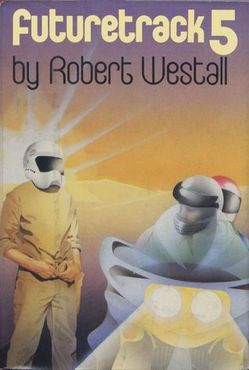
Robert Westall was a British author most famous for his story The Machine Gunners. I knew his name after seeing the BBC adaptation of that book on T.V. That was in 1983. To quote the Wiki entry, "Many of his novels aimed at a teenage audience deal with complex, dark and adult themes." Futuretrack 5 was published the same year, I probably came across it a year or two after that, when I was around thirteen or fourteen.
Despite being a teenager, I consciously avoided what is now known as YA or Young Adult fiction. I found the whole concept insulting. I was getting to grips with Elric of Melnibone and Nancy Drew didn't bear well by comparison. But I was browsing my local library in Neston, Wirral, one day and Futuretrack 5 caught my eye as I was ironically scanning the YA section and feeling all pompous and superior.
What I found was a thoughtful and bleak dystopian vision that pulled no punches and asked more questions than it answered. And, as with all the classics of the genre, no matter how some parts get dated the key concepts are icily familiar today. Strange that I should revisit it it now, the action is dated by the hospital death certificate of dystopia architect Charles Scott-Asbury - 26th September 2012 - who they "had missed him by four days."
The story follows Henry Kitson a young British lad coming out of the education system at twenty. To his knowledge, the country is split into two parts now, the unnems and the ests. The unnems are an underclass who live in large city-based fenced ghettos and are placated by entertainment complexes called Futuretracks that naturally attract then destroy leader types. The ests are a perpetual yuppie class enjoying the best of everything. The problem is that the ests breed too fast in their prosperity so come exam day, any students failing the tough tests are sent 'behind the wire' to the ghettos, on that very day.
The day is called parent's day:
The day mothers were so proud they wept, or so ashamed they lay down in hot baths and overdosed on valium. The day fathers locked themselves in studies and took down cherised antique revolvers from the wall ...
That quote and the vivid description of the day itself really gave my thirteen year old mind a start. That and the psychopters. Flying machines that can detect anger and violent emotions, then track you and ship you off to the lobo-farm where you will be lobotomised and dropped back into the ghetto or put to work on actual farms.
But then. Henry Kitson scores 100% on the exams and is whisked away to discover another layer beneath. He becomes a tech, the engineers and scientists responsible for the running of the automated systems that form the backbone of the nation. Once inside he excels once more and is assigned to shadow the chief systems analyst. There he will eventually take over the running of Laura, the supercomputer at the heart of everything. Although it is not the heart of everything. During his time he learns that there are a mysterious political class above all of this who are led by the ideas of Charles Scott-Asbury.
Kitson then discovers that techs can go 'on the razzle' and moonlight in the ghettos of the unnems. This is allowed to let techs blow off steam. Kitson goes to London and stays, effectively running away. Once there he becomes involved in the futuretracks. Futuretrack 5 is motorcycle racing on deadly live street courses. He falls for Keri Roberts, the current champion and a near suicidal racer who represents everything Kitson isn't. Together they bluff their way out of the London ghetto and ride their bike north, to find out what is really going on.
What they discover is pretty horrific and it disturbs me much more now than it did then. Scott-Asbury is running a huge social engineering program through his fascist hold on power. The countryside is being cleared and the unnems destroyed and drugged so reproduction rates drop. First they find Scotland to be completely empty of people and largely bulldozed. Glasgow, the last unnem ghetto, is all but self-destructed. Then they find a fenced community of 'pure' rural folk in the Cambridgeshire fens. The idea is to eventually repopulate the countryside with just the right amount of ideal Anglo-Saxon type stock that lead simple but productive lives.
Kitson decides he must go back to tech control and destroy Laura. But in doing so he must use Keri and his friends from the fens. This leads to a predictably tough, violent ending that is open, but in my view, quite devoid of hope. It also holds a philosophical coda when Kitson puts the 'knowledge bomb' into Laura but only succeeds in making it unable to act at all, even to help him. All it can do is question further, leaving Kitson - the only person able to use Laura at all - locked in a perpetual stalemate.
The book is both exciting and a well structured essay. Each chapter adds another dimension to both the action and the theme. There are set-pieces and characters, such as parents day or Blocky in Glasgow, that are both memorable and evocative of the issues of our time. The ban on camping, penalty - death, in a wild and unpopulated north reminded me of Bradbury and walking. At the heart of the story, the relationship between Kitson and Keri is also surprisingly realistic and frank.
The section where Kitson voices his disgust that the Ests watch the unnems TV station for the futuretracks, or his discovery of the people-watching in the fens nails modern entertainment culture exactly. Also, who of us that work with students, and especially who live here in China, can read the exam results scene and not wince. Perhaps 2012 was not so far off after all.